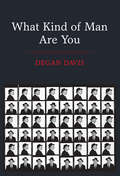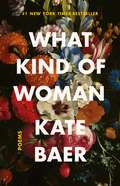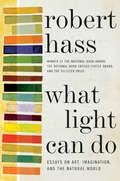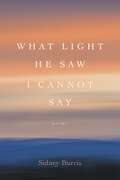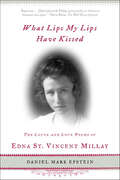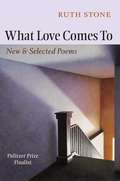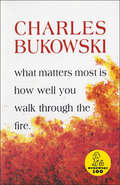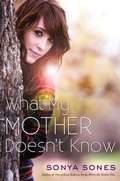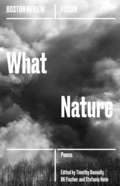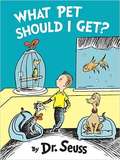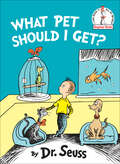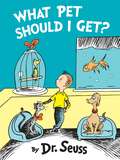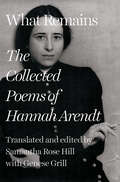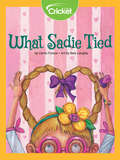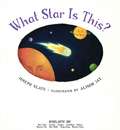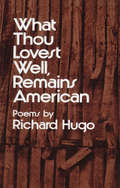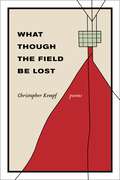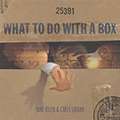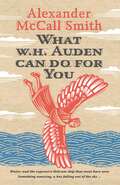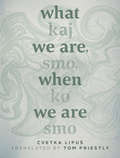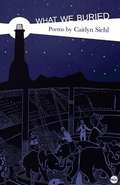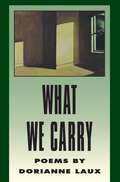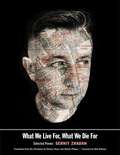- Table View
- List View
What Kind of Man Are You
by Degan DavisWhat does it mean to be a man now? These poems’ answers are bold and deeply moving.
What Kind of Woman
by Kate BaerThe Instant #1 New York Times Bestseller'Gorgeous.' Glennon Doyle'Sharp observations on modern womanhood.' Sunday Times'Exquisite.' Fi GloverA stunning and honest debut poetry collection about the beauty and hardships of being a woman in the world today, and the many roles we play - mother, partner, and friend.'When life throws you a bag of sorrow, hold out your hands/Little by little, mountains are climbed.' So ends Kate Baer's remarkable poem 'Things My Girlfriends Teach Me.' In 'Nothing Tastes as Good as Skinny Feels' she challenges her reader to consider their grandmother's cake, the taste of the sea, the cool swill of freedom. In her poem 'Deliverance' about her son's birth she writes 'What is the word for when the light leaves the body?/What is the word for when it/at last, returns?'Through poems that are as unforgettably beautiful as they are accessible, Kate Baer proves herself to truly be an exemplary voice in modern poetry. Her words make women feel seen in their own bodies, in their own marriages, and in their own lives. Her poems are those you share with your mother, your daughter, your sister, and your friends.
What Light Can Do: Essays on Art, Imagination, and the Natural World
by Robert HassUniversally lauded poet Robert Hass offers a stunning, wide-ranging collection of essays on art, imagination, and the natural world—with accompanying photos throughout. What Light Can Do is a magnificent companion piece to the former U.S. Poet Laureate’s Pulitzer Prize and National Book Award-winning poetry collection, Time and Materials, as well as his earlier book of essays, the NBCC Award-winner Twentieth Century Pleasures. Haas brilliantly discourses on many of his favorite topics—on writers ranging from Jack London to Wallace Stevens to Allen Ginsberg to Cormac McCarthy; on California; and on the art of photography in several memorable pieces—in What Light Can Do, a remarkable literary treasure that might best be described as “luminous.”
What Light He Saw I Cannot Say: Poems (Southern Messenger Poets)
by Sidney BurrisWhat Light He Saw I Cannot Say, a new poetry collection from Sidney Burris, explores the interplay of human consciousness and objective reality, always in celebration of the imaginative spirit that brings them into a productive and often spiritual conversation. Poems both demanding and beguiling gain a deeper resonance as they encourage us to understand the often mysterious links that unite the people and events that crowd our daily lives. Deploying themes that encompass the physical, the spiritual, and the meditative, What Light He Saw I Cannot Say remains rooted in the human condition while showing how this experience is rich with vision and transcendence.
What Lips My Lips Have Kissed: The Loves and Love Poems of Edna St. Vincent Millay
by Daniel Mark EpsteinA noted biographer and poet illuminates the unique woman who wrote the greatest American love poetry of the twentieth centuryWhat Lips My Lips Have Kissed is the story of a rare sort of American genius, who grew up in grinding poverty in Camden, Maine. Nothing could save the sensitive child but her talent for words, music and drama, and an inexorable desire to be loved. When she was twenty, her poetry would make her famous; at thirty she would be loved by readers the world over.Edna St. Vincent Millay was widely considered to be the most seductive woman of her age. Few men could resist her, and many women also fell under her spell. From the publication of her first poems until the scandal over Fatal Interview twenty years later, gossip about the poet's liberated lifestyle prompted speculation about who might be the real subject of her verses.Using letters, diaries and journals of the poet and her lovers that have only recently become available, Daniel Mark Epstein tells the astonishing story of the life, dedicated to art and love, that inspired the sublime lyrics of Edna St. Vincent Millay.
What Love Comes To
by Ruth Stone Sharon Olds"A collection of poems that give rich drama to ordinary experience, deepening our sense of what it means to be human."-Pulitzer Prize finalist citation"There is a broad, powerful streak of independence-even disobedience-that runs through Stone's writing and has inspired a great number of women after her."-GuardianFinalist for the 2009 Pulitzer Prize, this retrospective of Ruth Stone's poetry combines the best work from twelve previous volumes with an abundance of new poems. This comprehensive selection includes early formal lyrics, fierce political poems, and meditations on her husband's suicide and her own blindness. As Sharon Olds says in her foreword, "A Ruth Stone poem feels alive in the hands-ardent, independent, restless." What Love Comes To is a necessary collection from an American original.Can it be thatmemory is useless,like a torn webhanging in the wind?Sometimes it billowsout, a full high gauze-like a canopy.But the air passesthrough the rentsand it falls again and flapsshapelesslike the ghost rag that it is-hanging at the windowof an empty room.Ruth Stone is the author of twelve books of poetry. Among her many awards are the National Book Award, the National Book Critics Circle Award, the Eric Mathieu King Award, a Whiting Award, and she was a finalist for the 2009 Pulitzer Prize. She taught creative writing at many universities, finally settling at SUNY Binghamton. She lives in Vermont.
What Matters Most Is How Well You Walk Through the Fire
by Charles BukowskiThis second posthumous collection from Charles Bukowski takes readers deep into the raw, wild vein of writing that extends from the early 70s to the 1990s.
What My Mother Doesn’t Know
by Sonya SonesComposed entirely of short poems in free verse, What My Mother Doesn't Know captures the ups and downs of Sophie's freshman year of high school and her first real romance.
What Nature (Boston Review)
by Timothy Donnelly B. Fischer Stefania HeimPoetry that grapples with the intersection of natural and cultural crises. In an age of record-breaking superstorms and environmental degradation, What Nature seeks—through poetry—to make sense of how we interact with and are influenced by nature. Shifting its focus from what has already been lost to what lies ahead, What Nature rejects the sentimentality of traditional nature poetry. Instead, its texts expose and resist the global iniquities that create large-scale human suffering, a world where climate change disproportionately affects the poorest communities. The intersection of natural and cultural crises—like Standing Rock's fight against the Dakota Access Pipeline and the water crisis in Flint, Michigan—are confronted head on. These poems, lyric essays, and hybrid works grapple with political unrest, refugeeism, and resource exploitation, transforming the genre of ecopoetics. Contributors Kaveh Akbar, Zaina Alsous, Desirée Alvarez, Rae Armantrout, Aase Berg, Kyle Booten, Jericho Brown, Kyce Bello, Kayleb Rae Candrilli, Jesús Castillo,, Abigail Chabitnoy,Adam Day, Camille T. Dungy, Noah Dversdall, Gyrðir Elíasson, Tracy Fuad, Carolyn Guinzio, Amanda Hawkins, Sheikha Helawy, Claire Hero, Brenda Hillman, Joan Kane, Douglas Kearney, Benjamín Naka-Hasebe Kingsley, Nam Le, Diana Keren Lee, Adrian Lurssen, Matt Massaia, Iréne Mathieu, Ted Mathys, Christopher Nelson, Kathy Nilsson, Greg Nissan, Elsbeth Pancrazi, Sarah Passino, Rowan Ricardo Phillips, Roger Reeves, Evelyn Reilly, Emelia Reuterfors, Mutsuo Takahashi, Brian Tierney, Alissa Valles, Nicole Walker, Ellen Welcker
What Pet Should I Get?
by Dr SeussThis never-ever-before-seen picture book by Dr. Seuss about making up one's mind is the literary equivalent of buried treasure! What happens when a brother and sister visit a pet store to pick a pet? Naturally, they can't choose just one! <P><P> The tale captures a classic childhood moment--choosing a pet--and uses it to illuminate a life lesson: that it is hard to make up your mind, but sometimes you just have to do it! <P> Told in Dr. Seuss's signature rhyming style, this is a must-have for Seuss fans and book collectors, and a perfect choice for the holidays, birthdays, and happy occasions of all kinds. <P> An Editor's Note at the end discusses Dr. Seuss's pets, his creative process, and the discovery of the manuscript and illustrations for What Pet Should I Get?
What Pet Should I Get? (Beginner Books)
by Dr. SeussPick a pet with Dr. Seuss with this bestselling and silly tail of cats, dogs and more! A dog or a cat? A fish or a bird? Or maybe a crazy creature straight from the mind of Dr. Seuss! Which pet would YOU get? A trip to the pet store turns into a hilarious struggle when two kids must choose one pet to take home... but everytime they think they see an animal they like, they find something even better! Perfect for animal lovers and Seuss lover alike, this book will delight readers young and old. Discovered 22 years after Dr. Seuss's death, the unpublished manuscript and sketches for What Pet Should I Get? were previously published as a 48-page jacketed hardcover with 8 pages of commentary. This unjacketed Beginner Book edition features the story only. The cat? Or the dog? The kitten? The pup? Oh, boy! It is something to make a mind up. Beginner Books are fun, funny, and easy to read! Launched by Dr. Seuss in 1957 with the publication of The Cat in the Hat, this beloved early reader series motivates children to read on their own by using simple words with illustrations that give clues to their meaning. Featuring a combination of kid appeal, supportive vocabulary, and bright, cheerful art, Beginner Books will encourage a love of reading in children ages 3–7.
What Pet Should I Get? (Classic Seuss)
by Dr. SeussA #1 New York Times bestseller! This previously never-before-seen picture book by Dr. Seuss about making up one&’s mind is the literary equivalent of buried treasure! What happens when a brother and sister visit a pet store to pick a pet? Naturally, they can&’t choose just one! The tale captures a classic childhood moment—choosing a pet—and uses it to illuminate a life lesson: that it is hard to make up your mind, but sometimes you just have to do it! Told in Dr. Seuss&’s signature rhyming style, this is a must-have for Seuss fans and book collectors, and a perfect choice for the holidays, birthdays, and happy occasions of all kinds. An Editor&’s Note at the end discusses Dr. Seuss&’s pets, his creative process, and the discovery of the manuscript and illustrations for What Pet Should I Get?
What Remains: The Collected Poems of Hannah Arendt
by Hannah ArendtA landmark literary event, What Remains collects Arendt’s complete poetic oeuvre—never before published in English. Internationally renowned as one of the twentieth century’s foremost public intellectuals, Hannah Arendt was also intensely private. Though she often acknowledged that the language of poetry—especially that of Dickinson, Goethe, and Lowell—informed her work, only a few people knew that Arendt herself wrote poems. In fact, between 1923 and 1961, Arendt wrote seventy-four poems, many of them signposts in an otherwise unwritten autobiography. For nearly forty years after her death, these poems remained hidden among the archives of the Library of Congress, until 2011, when they were rediscovered by scholar and translator Samantha Rose Hill. Now, for the first time in English, Hill and Genese Grill present Arendt’s poems in chronological order, taking us from the zenith of the Weimar Republic to the Cold War, and from Marburg, Germany, to New York’s Upper West Side. Throughout, Arendt uses poetry to mark moments of joy, love, loss, and reflection. In “W. B.,” written in 1942, she remembers Walter Benjamin, who died near the French-Spanish border while attempting to flee the Nazis: “Gentle whispering melodies / Sound from the darkness. / We listen so we can let go.” So, too, she reflects on mutability and transience in 1946: “I know that the houses have fallen. / We entered the world in them, wonderfully sure, that they / were more durable than ourselves.” She tries to understand her place in the world: “Ironically foolish, / I’ve forgotten nothing, / I know the emptiness, / I know the burden, / I dance, I dance / In ironic splendor.” A gift to all readers of Arendt, this stunning, dual-language edition provides an unparalleled view into the inner sanctum of one of our most original thinkers.
What Sadie Tied
by Carrie FinisonSadie has learned to tie her shoes! Now she wants to tie everything she can. She ties her socks, her sleeves, and even her hair! She gets so excited about tying other things together, though, that she doesn’t notice her shoe has come untied again!
What Star Is This
by Joseph SlateThe spiritually enchanted tale of the arrival of Baby Jesus - from Mary and Joseph's journey to Bethlehem to the comet that illuminated the sky for the Wise Men - detailed in lyrical language and stunning illustrations, perfect for Christmastime.
What Thou Lovest Well, Remains American
by Richard HugoHugo's most important subject is the American West; as William Stafford said of The Lady in Kicking Horse Reservoir, "A part of the West belongs to Hugo. By telling over and over again its places and people he reclaims it from the very bleakness he confronts; and it all begins to loom as a great intense abode that we can't neglect, that we can't bear to let go." In the present volume, people, places, dreams, memories are explored again-always in search of the poet's self. Hugo for many years directed the creative writing program at the University of Montana. He died in 1982.
What Thou Lovest Well, Remains American: Poems
by Richard HugoHere is a collection of poems by a writer whom the poet Carolyn Kizer calls "one of the most passionate, energetic, and honest poets living." Hugo's most important subject is the American West. In the present volume, people, places, dreams, and memories are explored again--always in search of the poet's self.
What Though the Field Be Lost: Poems
by Christopher KempfBased on two years living and researching in Gettysburg, Pennsylvania, What Though the Field Be Lost uses the battlefield there as a way to engage ongoing issues involving race, regional identity, and the ethics of memory.With empathy and humility, Kempf reveals the overlapping planes of historical past and public present, integrating archival material—language from monuments, soldiers' letters, eyewitness accounts of the battle—with reflection on present-day social and political unrest. Here monument protests, police shootings, and heated battle reenactments expose the ambivalences and evasions involved in the consolidation of national (and nationalist) identity. In What Though the Field Be Lost, Kempf shows that, though the Civil War may be over, the field at Gettysburg and all that it stands for remain sharply contested. Shuttling between past and present, the personal and the public, What Though the Field Be Lost examines the many pasts that inhere, now and forever, in the places we occupy.
What To Do With a Box
by Jane YolenIf you give a child a box, who can tell what will happen next? It may become a library or a boat. It could set the scene for a fairy tale or a wild expedition. The most wonderful thing is its seemingly endless capacity for magical adventure, a feature imaginatively captured in cardboardesque art by Chris Sheban and rhythmically celebrated in this poetic tribute by renowned children's author Jane Yolen.
What W. H. Auden Can Do for You (Writers on Writers #5)
by Alexander McCall SmithBestselling novelist Alexander McCall Smith's charming account of how the poet W. H. Auden has helped guide his life—and how he might guide yours, tooWhen facing a moral dilemma, Isabel Dalhousie—Edinburgh philosopher, amateur detective, and title character of a series of novels by best-selling author Alexander McCall Smith—often refers to the great twentieth-century poet W. H. Auden. This is no accident: McCall Smith has long been fascinated by Auden. Indeed, the novelist, best known for his No. 1 Ladies Detective Agency series, calls the poet not only the greatest literary discovery of his life but also the best of guides on how to live. In this book, McCall Smith has written a charming personal account about what Auden has done for him—and what he just might do for you.Part self-portrait, part literary appreciation, the book tells how McCall Smith first came across the poet's work in the 1970s, while teaching law in Belfast, a violently divided city where Auden's "September 1, 1939," a poem about the outbreak of World War II, strongly resonated. McCall Smith goes on to reveal how his life has related to and been inspired by other Auden poems ever since. For example, he describes how he has found an invaluable reflection on life's transience in "As I Walked Out One Evening," while "The More Loving One" has provided an instructive meditation on unrequited love. McCall Smith shows how Auden can speak to us throughout life, suggesting how, despite difficulties and change, we can celebrate understanding, acceptance, and love for others.An enchanting story about how art can help us live, this book will appeal to McCall Smith's fans and anyone curious about Auden.
What We Are When We Are: Kaj smo, ko sm (Mingling Voices)
by Tom Priestly Cvetka LipušWorking within a postmodern style, this rhythmic and melodious collection of poems originally written in Slovenian by Cvetka Lipuš and translated here by Tom Priestly, blends the real with the surreal, dull urban lives with dreams. Lipuš, known for the lexical beauty of her work, dwells on topics of time and space which she handles in an almost revolving, irreverent manner. Priestly captures the maze-like characteristic of her verse and carefully reconstructs the sonoric beauty of the work in its original language.
What We Buried
by Caitlyn SiehlThis book is a cemetery of truths buried alive. The light draws you in where you will find Caitlyn there digging. When you get close enough, she'll lean in and whisper, Baby, buried things will surface no matter what, get to them before they get to you first. Her unbounded love will propel you to pick up a shovel & help- even though the only thing you want to do is kiss her lips, kiss her hands, kiss every one of her stretch marks and the fire that is raging in pit of her stomach. She'll see your eyes made of devour and sadness, she'll hug you and say, Baby, if you eat me alive, I will cut my way out of your stomach. Don't let this be your funeral. Teach yourself to navigate the wound.
What We Carry
by Dorianne LauxFinalist, 1994 National Book Critics Circle Award for Poetry. Dorianne Laux's poetry is a poetry of risk; it goes to the very edge of extinction to find the hard facts that need to be sung. What We Carry includes poems of survival, poems of healing, poems of affirmation and poems of celebration.
What We Carry (American Poets Continuum #Vol. 28)
by Dorianne LauxFinalist, 1994 National Book Critics Circle Award for Poetry. Dorianne Laux's poetry is a poetry of risk; it goes to the very edge of extinction to find the hard facts that need to be sung. What We Carry includes poems of survival, poems of healing, poems of affirmation and poems of celebration.
What We Live For, What We Die For: Selected Poems (The Margellos World Republic Of Letters)
by Virlana Tkacz Wanda Phipps Bob Holman Serhiy ZhadanAn introduction to an original poetic voice from eastern Ukraine with deep roots in the unique cultural landscape of post-Soviet devastation "Everyone can find something, if they only look carefully," reads one of the memorable lines from this first collection of poems in English by the world‑renowned Ukrainian author Serhiy Zhadan. These robust and accessible narrative poems feature gutsy portraits of life on wartorn and poverty-ravaged streets, where children tally the number of local deaths, where mothers live with low expectations, and where romance lives like a remote memory. In the tradition of Tom Waits, Charles Bukowski, and William S. Burroughs, Zhadan creates a new poetics of loss, a daily crusade of testimonial, a final witness of abandoned lives in a claustrophobic universe where "every year there's less and less air." Yet despite the grimness of these portraits, Zhadan's poems are familiar and enchanting, lit by the magic of everyday detail, leaving readers with a sense of hope, knowing that the will of a people "will never let it be / like it was before."
